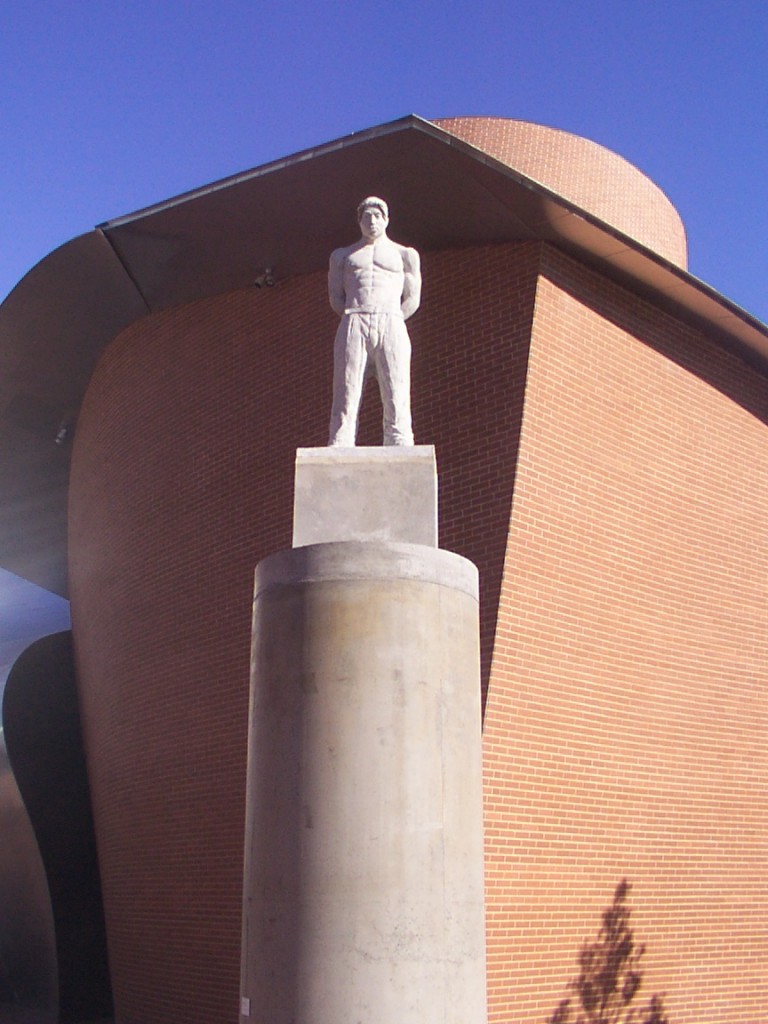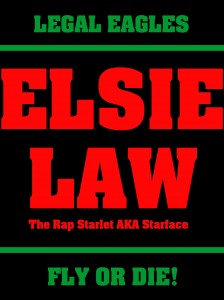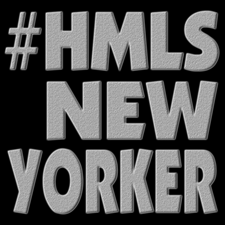 A statue of Tupac Shakur created by Italian artist, Paola Chiasera, and displayed at the Marta Museum in Germany.
A statue of Tupac Shakur created by Italian artist, Paola Chiasera, and displayed at the Marta Museum in Germany.
A Picture Is Worth A Thousand Words Pic Of The Week
Black History Fact Of The Day
Quote Of The Day
Book Excerpt Of The Week: Part 2- “King Of The Cats: The Life and Times Of Adam Clayton Powell Jr.” By: Wil Haygood
 Here are some more interesting snippets from, “King Of The Cats”:
Here are some more interesting snippets from, “King Of The Cats”:
On Hazel Scott’s (Adam Clayton Powell’s 2nd wife) Run-In With Gangster Bugsy Siegel: “Scott was, however, one of the first Blacks to get work in Las Vegas, along with Sammy Davis Jr., and Nat King Cole. She took her pride to the desert. A gangster- at the time she didn’t know he was a gangster- once spotted her in a Las Vegas lounge, relaxing. ‘Get out of here,’ the gangster said. Scott wouldn’t budge. ‘What are you going to do, kill me?’ she replied…Bugsy Siegel left the proud woman alone.
On Jackie Robinson’s Connection To New York Politics: “Jackie Robinson was a community affairs adviser to Rockefeller [New York’s Republican Governor].”
On James Meredith’s Connection To New York Politics: “Then, in what they concluded was a brilliant stroke, the Republicans decided to extend full backing to a young Columbia Law School student who was also an army veteran: James Meredith. Meredith represented both tragedy and hope in America. He had been forced to walk a gauntlet shielded by federal marshals at the University of Mississippi, which he integrated in 1962. Then, on June 6, 1966, while embarking on a voting rights march in the South, he was shot. Moving north, to New York City, Meredith entered Columbia Law School. He was a shy young man, and painfully aloof; the latter attribute gave acquaintances the feeling that he was either a stark visionary or had suffered unbearable mental stress which had permanently marked his personality.
‘The Republican Party made me an offer: full support for the seat, in every way, everything,’ recalled Meredith. Meeting in the comfort of swank hotel rooms with men sent by Rockefeller himself, Meredith found the overtures inviting; victory was made to look, and sound, quite possible. Access to the state’s top Republicans gave him a heady feeling: ‘I didn’t deal with details, and I didn’t deal with people who didn’t matter.’ He announced his candidacy.
Harlemites knew little of James Meredith; his presence had not been felt in the community. His currency as tragic hero meant nothing to local people, who saw him as a dupe of the Republicans…Pummeled with criticism from both Harlemites and national organizations such as SNCC and CORE that were sympathetic to Powell, Meredith was forced to retreat within a week’s time to rethink his position.”
On Columbia University’s Early Gentrification Of Harlem: “When Columbia University began moving into Harlem, taking over buildings and dislocating the poor, in the spring of 1968, it ignited angry student demonstrations. Administration buildings were stormed; students were handcuffed and paraded off to jail. It was the kind of demonstration made for Powell’s politics. He called meetings in his church basement and delivered a paper attacking the administration: ‘The Massacre of Harlem by Columbia University.'”
Adam Clayton Powell & The New York Knicks: “The Knicks were a uniquely synchronized team, a team of players like Bill Bradley and Walt Frazier, Willis Reed and Dick Barnett. They were a group of individualists who had managed to put the concept of team first. And Adam Clayton Powell admired their savoir-faire. The attraction was mutual: the Knicks adopted Powell as their un-official chaplain. They played their home games at the Garden. It was the new Garden, as opposed to the old Garden, scene of so many of Powell’s own triumphs- of the big war bond rallies, the freedom rallies, the rallies where his voice thundered, rallies that sent New Yorkers into the streets talking up his name. So there he would be after Knicks games, in the locker room, cigarette in hand, looking up at the huge bodies as if they were sequoia trees, patting individual players on the back. ‘They treated him like a king,’ said William Epps.”
Book Excerpt Of The Week: Part 1- “King Of The Cats: The Life and Times Of Adam Clayton Powell Jr.” By: Wil Haygood
 Here are some interesting facts that I gleaned about Adam Clayton Powell Jr. (the first Black congressman from NY), from the biography, “King Of The Cats: The Life and Times Of Adam Clayton Powell Jr.” By: Wil Haygood:
Here are some interesting facts that I gleaned about Adam Clayton Powell Jr. (the first Black congressman from NY), from the biography, “King Of The Cats: The Life and Times Of Adam Clayton Powell Jr.” By: Wil Haygood:
On The Marcus Garvey/Adam Clayton Powell Jr. Connection:
“As a little boy, Adam Powell Junior had climbed to the rooftop of the Abyssinian Baptist Church and looked down on parades led by the enigmatic Marcus Garvey, proponent of racial pride and Black activism.”
On Adam Clayton Powell’s Involvement In The Wedding Of Nat King Cole:
“Following his Easter sermon, [Adam Clayton Powell Jr.] officiated at the marriage of Maria Ellington to a most eligible bachelor, the crooner-pianist Nat King Cole; afterward everyone dashed to the Waldorf for the reception.”
On JFK, Nixon, and Powell’s Tenure Together In Congress:
“Among the new House in the 80th Congress were two future presidents, Richard Nixon elected in California in a bitter fight against Jerry Voorhis, a liberal Democrat; and John F. Kennedy of Massachusetts, a World War II hero. Both freshman congressman joined Powell on the Labor Committee.”
Black History Fact Of The Day
TODAY IS BUY BLACK FRIDAY
PLEASE PASS THIS ON! (EACH ONE TEACH ONE OR TWO!) THIS IS PHASE ONE ON HOW WE CAN HELP TO STRENGTHEN & EMPOWER OUR COMMUNITY:
 The 2008 not guilty verdict in the Sean Bell case evoked outrage, emotion, and debate. It is not an anomaly that the police officers involved in the Sean Bell slaying were acquitted of all charges on all counts in State Supreme Court. I could run out of ink printing the names of people who have been victimized by the inaptly named justice system.
The 2008 not guilty verdict in the Sean Bell case evoked outrage, emotion, and debate. It is not an anomaly that the police officers involved in the Sean Bell slaying were acquitted of all charges on all counts in State Supreme Court. I could run out of ink printing the names of people who have been victimized by the inaptly named justice system.
The American justice system has been especially terroristic towards the African American community. Many community members can cite historic and personal accounts to prove this. Therefore, it would be foolhardy (at the least) to turn to a system that has methodically oppressed us, and request that they free us. We can only free ourselves through extreme discipline and intelligent planning.
As a community we have been too compliant with leaders who organize ineffective, delayed reactions. The only strategy that can save us in this last hour is one that calls for a collective code of conduct that will be conducive to improving the conditions of our community, and shifting the paradigm of how we are treated by outside entities. The first step of this code of conduct should be based on economics.
The old adage of “money talks,” still reigns true in the new millennium. Any political scientist worth his or her library card will tell you that: “Economic powerlessness equals political powerlessness,” and conversely “economic power equals political power.” This means that if we continue to allow our wealth to be extracted from our community, we will remain impotent.
The power of the collective “Black Dollar” is often discussed. However, that power has been left unchanneled. Today is the day to change that. A one-time boycott is not going to bring long-term change and respect to our community. Our community has launched boycotts before. Our success and ascension will be based on what we consistently do. For this reason, we should initiate “BUY BLACK FRIDAYS.”
BUY BLACK FRIDAYS is a small step towards our community acquiring power via controlling our economics. Every Friday, people who acknowledge the injustice and oppression that the African American community has been consistently subjected to should do one of the following:
Option #1: Spend $0 on Friday
Option #2: Spend no more than $10 on Friday
Option #3: Only Shop at Black Businesses on Friday
[PLEASE NOTE THAT THE ABOVE OPTIONS CAN & SHOULD BE EXERCISED ON A DAILY BASIS. However, we can all at the very least focus on Fridays. This way we can take a collective stand and build our collective discipline. Please remember that this is only Phase 1!].
To the people who are tempted to label “BUY BLACK FRIDAYS” as racist, I say this: In the big scheme of things, this is about right & wrong, justice & injustice. The African American community is a strong, proud community that has endured the brunt of America’s iron fist. We must stop the pounding. I feel that any fair-minded individual will concur, and join in.
ANY business that is privileged to enjoy the support of the African American community MUST return that support.
I thank you in advance for your effort and dedication.
-Elsie Law AKA Starface
Quote Of The Day
Slavery After Emancipation: Debt Slavery & Forced Confessions In Kangaroo Courts
 “The county convict leasing system, with its efficient mechanisms for forcing Black men to do the bidding of White business operators, soon leached into the process of collecting debts of any kind. White farmers who advanced money to Black tenants at the beginning of a crop season began to enforce their debts not by evicting those Black men who fell behind, but by swearing out criminal warrants accusing them of fraud. Facing certain conviction by a local White judge, most laborers willingly agreed to accept their White landlords- who had brought them to court in the first place- as their ‘sureties.’ The defendants typically would ‘confess judgment, an archaic legal concept under which the accused confesses his responsibility before being tried. The local judge then accepted payment and forfeiture of a bond from the White surety, rather than render a verdict on the alleged ‘crime.’ In return, the African American farmer would sign a contract to work without compensation for the White landlord for however long it took to pay back the amount of the bond.
“The county convict leasing system, with its efficient mechanisms for forcing Black men to do the bidding of White business operators, soon leached into the process of collecting debts of any kind. White farmers who advanced money to Black tenants at the beginning of a crop season began to enforce their debts not by evicting those Black men who fell behind, but by swearing out criminal warrants accusing them of fraud. Facing certain conviction by a local White judge, most laborers willingly agreed to accept their White landlords- who had brought them to court in the first place- as their ‘sureties.’ The defendants typically would ‘confess judgment, an archaic legal concept under which the accused confesses his responsibility before being tried. The local judge then accepted payment and forfeiture of a bond from the White surety, rather than render a verdict on the alleged ‘crime.’ In return, the African American farmer would sign a contract to work without compensation for the White landlord for however long it took to pay back the amount of the bond.
The instances of confessing judgment spread rapidly through the farming regions of the South, according to local court dockets of the 1880s and 1890s…On its face, the arrangement appeared similar to other practices that would remain common in the courts for the next century and beyond- granting mercy to a criminal partly in exchange for a commitment to repair the damage of their crimes, and place themselves under the close supervision of a trusted party.
Occasionally, confessing judgment in the 1880s was precisely just such a legitimate, human resolution of a legal matter. But only rarely. The records of thousands of prosecutions show it was vastly more likely that an arrested Black man- knowing he had no possibility of true due process, or acquittal- agreed to confess judgment specifically to avoid the far more dire alternatives that he knew lay in wait. It was the nineteenth-century equivalent to modern plea bargains, in which a defendant agrees to a lesser sentence ahead of trial in order to be spared any possibility of the most severe punishment. The exception being that in the variation of this practice in the 1880s, it was a nearly forgone conclusion that the man under arrest would be found guilty of something. Often, his only hope for moderating the blow was to negotiate the most bearable form of forced labor.
The Black men who confessed judgment avoided being sold into the slave mines, but traded that fate for onerous labor contracts closer to home or working under men they had at least elementary knowledge of- their present landlord, or often with the same farm families under whom they or their slave forebears had worked in antebellum times. The result was that Black tenant farmers and sharecroppers often returned as uncompensated convict laborers, subject to imprisonment, shackles, and the lash, to the same fields where a few days earlier they had worked as independent, free men. White farmers often continued to claim that convict laborer was incurring additional debts for necessities such as visits by a doctor, medical care, clothing, damaged implements, or housing. Once captured by a contract under which the Black man was not free until all his debts were paid, the ‘convict’- who in fact might never have been found guilty of a crime- could be held almost indefinitely. Moreover, almost any White person who became involved in the resolution of a Black man’s legal situation could casually add his own ‘costs’ to the balance of a prisoner’s debt and compel him to labor for an even longer period.” -From, “Slavery By Another Name” By: Douglas A. Blackmon
Definitions Better Than Webster’s: POWER
“Power is defined, in physics, as any form of energy or force available for work or applied to produce motion or pressure. Used in terms of social dynamics, the term power has essentially the same meaning, namely, the force required to bring about- or to prevent- social, political, or economic changes. It is relevant to an understanding of the problems of disadvantaged minority groups and their confinement within ghettos that one of the meanings of the term power emphasizes the possession of control or command or authority over others and directly relates to the problem of status. The form of power that is most significant in the understanding of social change is that combination of energies required to determine and to translate goals into a desired social reality.
The effective, constructive use of power is indicated not merely by expressing a desire for change, but by the demonstration of the ability to achieve it. There is an important and often overlooked distinction between pseudopower, which is restricted to a verbal or posturing level of reality- by word or by acting ‘as if’- and actual power, demonstrated in social action and social change, the significant social power. Social action may be used as a form of diversion of power under the conditions where the significant political and economic forces permit certain action as a mere escape valve and as a displacement of energy. It is possible for the forces aligned for the perpetuation of the status quo to permit the power of those who desire social change to be dissipated into mere appearances of social action- catharsis- without observable and meaningful progress. This can be a most effective technique of control, exploiting as it does the democratic ritual of freedom of protest. In the final analysis, however, the key criterion- the significant basis of actual power- must be a demonstrated change in a desired direction.” -From, “Dark Ghetto: Dilemmas of Social Power” By: Kenneth B. Clark



